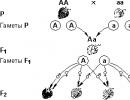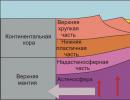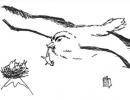“A person must be intelligent. Essay on the topic “what does it mean to be intelligent”
Intelligence in my understanding is not only education, but also moral qualities.
D. Likhachev
Plan
1. About the origin of the word “intellectual”.
2. Is it difficult to be an intellectual in our time?
a) intelligence and education;
b) intelligence is the result of self-education.
3. “Everything in a person should be beautiful...”
The word “intellectual” comes from the Latin “intelligence”, and it was introduced into use in the eighteenth century by the Russian writer P. Boborykin. The intelligentsia, in contrast to workers and peasants engaged in manual labor, began to be called educated people, people of mental work: scientists, engineers, doctors, teachers, writers, artists. Once there were not so many representatives of these professions, but now there are countless such professions, and millions of people are employed in them.
The concepts of “education” and “intelligence” are often used together. But does this mean that every educated person is an intellectual? Is it possible to say that intelligence is, first of all, education? It turns out not. A person who has received an education and has certain knowledge may not be an intellectual. After all, there are unintelligent doctors of science and intelligent workers. Even F. Dostoevsky noted that “it is not the mind that is important, but what guides it - nature, heart, noble qualities, development.” Life has shown: it is not at all difficult to belong to the intelligentsia, but it is more difficult to be intelligent. What people seem intelligent to us? Polite? Well-mannered? Delicate? Then maybe it’s enough to learn not to be rude and give way to women and older people? An intelligent person is not only one who knows how to behave at the table, is not rude, and does not insult others. These are simply rules of behavior in society. You can repeat the words “sorry”, “excuse me”, “please” all the time, but not be intelligent. Perhaps it's a matter of special education? Indeed, raising intelligence is an important thing, but, unfortunately, there are no special schools or lessons where such a subject would be studied.
Intelligence is a moral concept, it is the result of self-education, it cannot be acquired without great internal work. It testifies to a person’s enormous demands on himself and constant self-control. We often pass by each other without attention, indifferently, not noticing anything around us. An intelligent person will not do this, because the secret of intelligence is attention. Our life is full of surprises and accidents. We may accidentally offend or offend someone. But the main thing is different: an intelligent person realizes what he has done and will suffer because of it. An intelligent person will not harm another for his own sake. He will not do to others what he would not like to do to himself. He will not ask for what he can do himself. Intelligence is, first of all, sincerity. People often lie for their own benefit. But an intelligent person cannot put his own benefit above the interests of other people.
Being intelligent in our time is not easy, but it is impossible to live without such people. An intelligent person respects others. He will not advance, but will give way; he will not hide, but share; he will not shout, but will listen; it will not tear, but glue. It is easy and pleasant to communicate with an intelligent person; he knows a lot about the achievements of human culture, he creates and creates. And most importantly, it has amazing, elusive properties of the soul, which make a person intelligent. Probably, A.P. Chekhov can be considered a real intellectual, who said: “Everything in a person should be beautiful: his face, his clothes, his soul, and his thoughts.”
Undoubtedly, each of us has more than once thought about the essence of real intelligence, tried to mentally find out whether the traits of his own personality and his actions correspond to the mental model. And everyone was faced with the fact that there was no clear answer to the question “Who is a modern intellectual?” It's not always easy. Do the concepts of “education” and “intelligence” coincide? Is it possible to cultivate intelligence in yourself or do you have to be born with it? I will try to answer these questions.
The word “intellectual” appeared relatively recently
- in the first half of the nineteenth century. The youth of this concept is explained by the fact that the division of labor into mental and physical arose only during the scientific and technological revolution, giving birth to a new social stratum - the intelligentsia, i.e. people who make a living with their minds. Previously, during the time of the feudal order, there was no need for the word “intellectual”, since the monopoly on mental work belonged exclusively to the aristocracy, i.e. to the feudal lords themselves.
Today, the word “intellectual” has acquired some other meaning. In order for a person to have the right to be called an intellectual, in addition,
To work mentally, he must have a number of other equally important qualities. For this it is not enough to have a higher education, Good work, refined manners and such seemingly “indispensable” external attributes of the intelligentsia as a jacket, hat, shirt with tie and glasses. You don't have to be a pompous academic, a prominent political figure, or a great writer. A true intellectual, in my opinion, will never show his superiority over a lesser one. educated person, who may be at the lowest social level; in communication, an intellectual is simple and relaxed, does not try to seem smarter than he is, because he knows his own worth and behaves with dignity.
Intelligence cannot always be explained by origin, parents, upbringing, wealth or poverty. Even high education is not a guarantee of intelligence, since we know glaring examples of moral ignorance precisely among holders of documents higher education. And vice versa, we know examples of real intelligence and internal culture among people of simple origin who do not have diplomas. A striking example– Ekaterina Belokur, an uneducated peasant woman who, on her own, reached fantastic heights in painting. The artist’s amazing paintings are a reflection of harmony inner world and surrounding beauty.
An intellectual is always a patriot whose soul is rooted in the fate of the Motherland. IN Soviet times many real intellectuals served time in camps, they were tortured and shot, but nothing could change their essence.
I believe that a true intellectual is, first of all, a person of “spirit,” a person of deep “internal” culture, filled with self-esteem and deep respect for other people. This is a person who has strong convictions and does not yield to them either under the pressure of material difficulties, or under the influence of life’s temptations, or under the threats of nobles. Perhaps the most important trait of an intelligent person is inner freedom and independence of thought, for which, unfortunately, he often has to pay a high price, sometimes even giving up own life. The example of real “knights of the spirit” encourages self-improvement and illuminates the life path for each of us.
WhatMeansbeintelligent?
Plan
1. ABOUT origin of the word "intellectual".
2. Is it difficult to be an intellectual in our time?
a) intelligence and education;
b) intelligence is the result of self-education.
3. “Everything in a person should be beautiful...”
Intelligence in my understanding is not only education, but also moral qualities. D. Likhachev
The word “intellectual” comes from the Latin “intelligence”, and it was introduced into use in the eighteenth century by the Russian writer P. Boborykin. The intelligentsia, in contrast to workers and peasants engaged in manual labor, began to be called educated people, people of mental work: scientists, engineers, doctors, teachers, writers, artists. Once there were not so many representatives of these professions, but now there are countless such professions, and millions of people are employed in them.
The concepts of “education” and “intelligence” are often used together. But does this mean that every educated person is an intellectual? Is it possible to say that intelligence is, first of all, education? It turns out not. A person who has received an education and has certain knowledge may not be an intellectual. After all, there are unintelligent doctors of science and intelligent workers. Even F. Dostoevsky noted that “it is not the mind that is important, but what guides it - nature, heart, noble qualities, development.” Life has shown: it is not at all difficult to belong to the intelligentsia, but it is more difficult to be intelligent. What people seem intelligent to us? Polite? Well-mannered? Delicate? Then maybe it’s enough to learn not to be rude and give way to women and older people? An intelligent person is not only one who knows how to behave at the table, is not rude, and does not insult others. These are simply rules of behavior in society. You can repeat the words “sorry”, “excuse me”, “please” all the time, but not be intelligent. Perhaps it's a matter of special education? Indeed, raising intelligence is an important thing, but, unfortunately, there are no special schools or lessons where such a subject would be studied.
Intelligence is a moral concept, it is the result of self-education, it cannot be acquired without a lot of internal work. It testifies to a person’s enormous demands on himself and constant self-control. We often pass by
each other without attention, indifferently, not noticing anything around. An intelligent person will not do this, because the secret of intelligence is attention. Our life is full of surprises and accidents. We may accidentally offend or offend someone. But the main thing is different: an intelligent person realizes what he has done and will suffer because of it. An intelligent person will not harm another for his own sake. He will not do to others what he would not like to do to himself. He will not ask for what he can do himself. Intelligence is, first of all, sincerity. People often lie for their own benefit. But an intelligent person cannot put his own benefit above the interests of other people. Being intelligent in our time is not easy, but it is impossible to live without such people. An intelligent person respects others. He will not advance, but will give way; he will not hide, but share; he will not shout, but will listen; it will not tear, but glue. It is easy and pleasant to communicate with an intelligent person; he knows a lot about the achievements of human culture, he creates and creates. And most importantly, it has amazing, elusive properties of the soul, which make a person intelligent. Probably, A.P. Chekhov can be considered a real intellectual, who said: “Everything in a person should be beautiful: his face, his clothes, his soul, and his thoughts.”
What does it mean to be intelligent?
1. About the origin of the word “intellectual”.
2. Is it difficult to be an intellectual in our time?
A) intelligence and education;
B) intelligence is the result of self-education.
3. “Everything in a person should be beautiful...”
Intelligence in my understanding is not only education, but also moral qualities.
D. Likhachev The word “intellectual” comes from the Latin “intelligence”, and the Russian writer P. Boborykin introduced it into use back in the eighteenth century. The intelligentsia, in contrast to workers and peasants engaged in manual labor, began to be called educated people, people of mental work: scientists, engineers, doctors, teachers, writers, artists. Once there were not so many representatives of these professions, but now there are countless such professions, and millions of people are employed in them.
The concepts of “education” and “intelligence” are often used together. But does this mean that every educated person is an intellectual? Is it possible to say that intelligence is, first of all, education? It turns out not. A person who has received an education and has certain knowledge may not be an intellectual. After all, there are unintelligent doctors of science and intelligent workers. Even F. Dostoevsky noted that “it is not the mind that is important, but what guides it - nature, heart, noble qualities, development.” Life has shown: it is not at all difficult to belong to the intelligentsia, but it is more difficult to be intelligent. What people seem intelligent to us? Polite? Well-mannered? Delicate? Then maybe it’s enough to learn not to be rude and give way to women and older people? An intelligent person is not only one who knows how to behave at the table, is not rude, and does not insult others. These are simply rules of behavior in society. You can repeat the words “sorry”, “excuse me”, “please” all the time, but not be intelligent. Perhaps it's a matter of special education? Indeed, raising intelligence is an important thing, but, unfortunately, there are no special schools or lessons where such a subject would be studied.
Intelligence is a moral concept, it is the result of self-education, it cannot be acquired without a lot of internal work. It testifies to a person’s enormous demands on himself and constant self-control. We often pass by each other without attention, indifferently, not noticing anything around us. An intelligent person will not do this, because the secret of intelligence is attention. Our life is full of surprises and accidents. We may accidentally offend or offend someone. But the main thing is different: an intelligent person realizes what he has done and will suffer because of it. An intelligent person will not harm another for his own sake. He will not do to others what he would not like to do to himself. He will not ask for what he can do himself. Intelligence is, first of all, sincerity. People often lie for their own benefit. But an intelligent person cannot put his own benefit above the interests of other people.
Being intelligent in our time is not easy, but it is impossible to live without such people. An intelligent person respects others. He will not advance, but will give way; he will not hide, but share; he will not shout, but will listen; it will not tear, but glue. It is easy and pleasant to communicate with an intelligent person; he knows a lot about the achievements of human culture, he creates and creates. And most importantly, it has amazing, elusive properties of the soul, which make a person intelligent. Probably, A.P. Chekhov can be considered a real intellectual, who said: “Everything in a person should be beautiful: his face, his clothes, his soul, and his thoughts.”
(1) What is classical literature? (2) What is classical Russian music? (3) What is Russian painting, in particular the Peredvizhniki? (4) And this, among other things, is also the Russian intelligentsia and intelligence, from which came creators who knew how to express their mindset, aspirations and everything that we call the spiritual world of the people.
(5) A person who calls himself an intellectual thereby took upon himself very clear moral obligations. (6) The measure of intelligence was not only beliefs, morality, and creativity as such, but also actions.
(7) A person who insulted a servant, an unfamiliar passer-by, a man who came to the market, a beggar, a shoemaker, a conductor, was not accepted in the intelligentsia, they turned away from him, but the same person who was insolent to his superiors aroused complete trust.
(8) Careerism was not encouraged to any extent, but in some cases it was tolerated: if the careerist “did not forget the poor and his own dignity” - that was roughly the rule.
(9) Getting rich was despised, especially in cases where the rich person did not provide material assistance to anyone. (10) It was not shameful to come to a rich man, if not with a demand, then with an insistent request to donate to such and such social and good needs.
(11) Precisely because intelligence provided for the morality of action and lifestyle, it was not a class, and Count Tolstoy was an intellectual, and a craftsman was one.
(12) The Code of Intelligence was never written anywhere, but was clear to everyone who wanted to understand it. (13) He who understood him knew what was good and what was bad, what was possible and what was not.
(According to S. Zalygin)
Introduction
Sometimes it is difficult to clearly define what intelligent behavior is and what is the opposite of it. How does an intelligent person differ from total mass? Are there any special rules for a person to become intelligent? Writers, sociologists and philosophers have been thinking about this for more than one generation.
Problem
The problem of intelligence is also raised by the Russian writer-publicist S. Zalygin. He tries to correlate the very concept of intelligence and its embodiment in the life of society.
A comment
The author asks the question of what Russian literature, music, painting are, inextricably linking these concepts with the intelligentsia and intelligence, which helped the masters of words and painting to express the features of the surrounding world, the internal aspirations of the common people.
Next, the author talks about the high moral responsibility of a person who calls himself an intellectual. The main measure of intelligence is not only beliefs, morals or creativity, but also actions. A person who insulted the disadvantaged and needy was not accepted in an intelligent environment. At the same time, the person who shouted at his superiors aroused confidential respect.
The thirst for profit and career growth were not welcomed, especially if the person did not help the disadvantaged. It was very important not to lose self-esteem and donate to public needs.
Author's position
S. Zalygin says that the code of intelligence has never been written, but is understandable to everyone. Anyone who understands the very essence of intelligence knows what is good and what is bad, what can be done and what cannot be done.
Intelligence does not depend on a person’s social affiliation; it is a special internal quality.
Your position
I agree with the author that intelligence is not education, talent or morality. These are all the listed traits, specially formed into a single internal state that does not allow a person to lose his own dignity and humiliate the dignity of others.
Argument 1
Intelligence is assessed by others by a person’s ability to behave in different situation, in the company of people. Another important criterion of intelligence is spirituality. L.N. Tolstoy in the novel “War and Peace” presents us with true intelligence in the person of one of the main characters - Andrei Bolkonsky.
Prince Andrei is a strong, strong-willed person, intelligent, educated, with deep patriotic feelings, mercy and spirituality. High society with its cynicism and lies repels Bolkonsky. Gradually abandoning the rules by which he lives high society, Andrey is trying to find happiness in military operations.
Having gone through a difficult path on the battlefields, the hero affirms compassion, love and kindness in his soul. These traits make him a true intellectual. Many modern young people could take an example from him.
Argument 2
In another work, the writer, on the contrary, asserts the lack of intelligence in his heroes. A.P. Chekhov in the comedy “The Cherry Orchard” reflects on memory and shows the life of impoverished nobles of the late 19th century, who, through their own stupidity, lose their family estate, the cherry orchard, dear to their memories, and their closest and dearest people.
They do not want to do anything, are not fit for work, are not keen on reading or comprehending science, and do not understand anything about art. In other words, in the heroes of the comedy the reader observes a complete lack of spiritual and mental work. Therefore, despite their high origin, it is difficult to call them intellectuals. According to A.P. Chekhov, people are obliged to improve themselves, work hard, help those in need, and strive for the highest manifestation of morality.
Conclusion
In my opinion, to be a real person, a person with capital letters, and means to be an intellectual. Intelligence is the ability to subordinate your life to the laws of mercy, goodness and justice.






